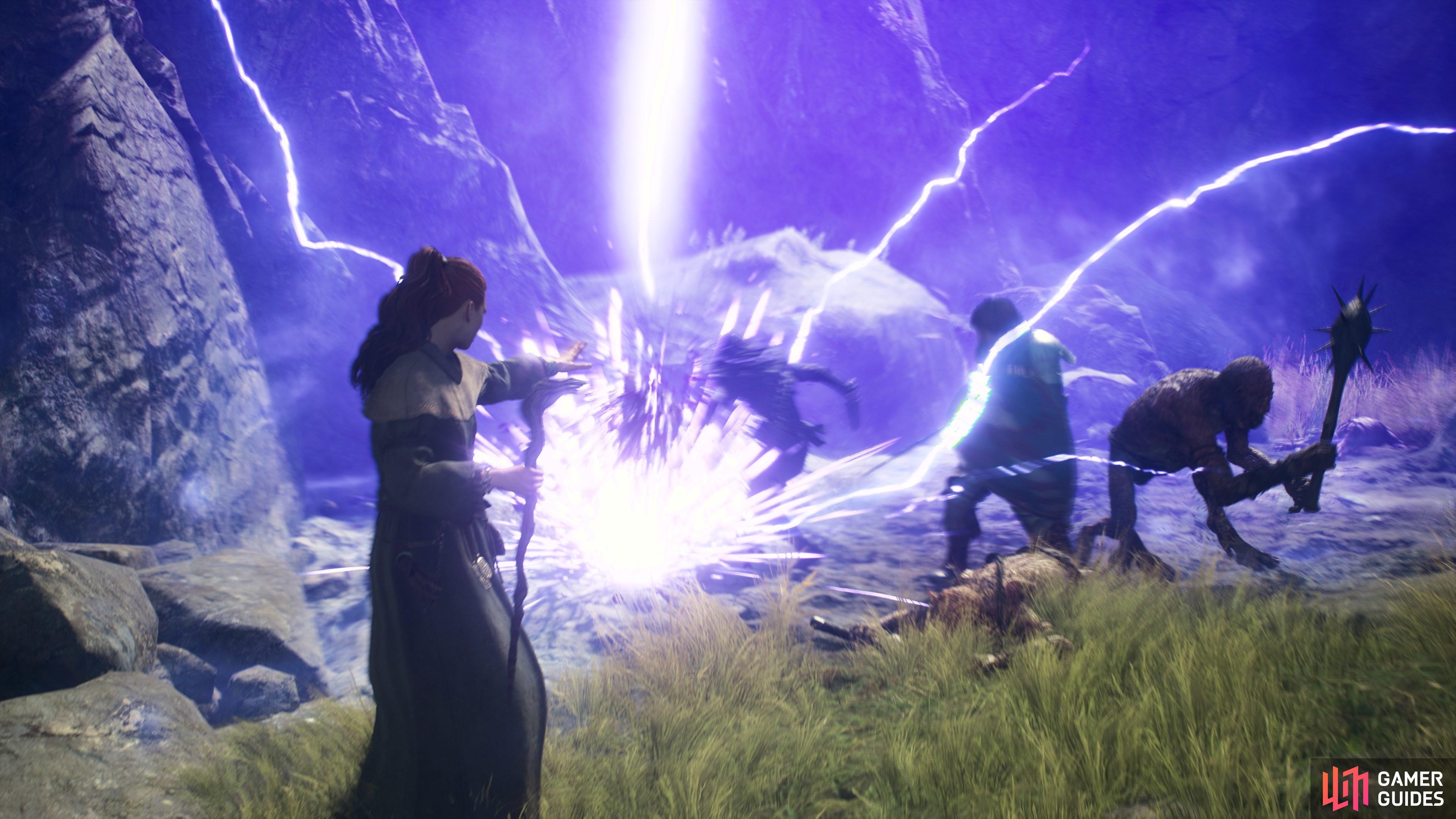The ![]() Mage is one of the starter classes that players can select as part of their initial steps into the
Mage is one of the starter classes that players can select as part of their initial steps into the ![]() Dragon’s Dogma 2 campaign. If you select this class, you’re in for an early forte into the world of spell casting, along with experimenting with damage and support spells. As you get to grips with the class, you’ll discover that the Mage is the king of support tools in DD2, and a class that offers a very unique supportive playstyle. To give you a better overview of what to expect from the class, here’s a closer look at the Dragon’s Dogma 2 Mage vocation.
Dragon’s Dogma 2 campaign. If you select this class, you’re in for an early forte into the world of spell casting, along with experimenting with damage and support spells. As you get to grips with the class, you’ll discover that the Mage is the king of support tools in DD2, and a class that offers a very unique supportive playstyle. To give you a better overview of what to expect from the class, here’s a closer look at the Dragon’s Dogma 2 Mage vocation.
Mages are masters of magic. They use it to support and aid allies while occasionally dishing out damage. Here’s everything you need to know about Mages in Dragon’s Dogma 2. Image via Capcom.
Dragon’s Dogma 2 Mage Vocation Overview¶
When you select a Mage to be your character or a Mage Pawn to join your party, you will unlock a very powerful support class. The class is largely defined through its unique healing core skill, ![]() Anodyne, which spawns a small circle healing aura around the caster. Yet, the class has more healing spells, such as the Argent named spells, along with other defensive and curative spells like
Anodyne, which spawns a small circle healing aura around the caster. Yet, the class has more healing spells, such as the Argent named spells, along with other defensive and curative spells like ![]() Palladium and
Palladium and ![]() Halidom.
Halidom.
The class also has access to damaging spells and more offensive support spells, all of which you can mix and match to make the perfect Mage for your party and the encounters you’re heading into. This level of game knowledge is a core part of what makes a player go from basic to allowing more advanced tactics, so it’s better to prepare yourself against some of the harder fights and bosses to come as you go through the game.
As a general summary of the class, this pros and cons list should give you an idea of what to expect from the Mage vocation in Dragon’s Dogma 2.
| Pros | Cons |
|---|---|
| Strong Support vocation | Squishy |
| Safe backliner | Low damage class |
| Easy to play | Lots of micromanagement until better Augments and spell upgrade unlock. |
| Only healing class in the game | |
| Unlocked from the start. |
As for the remainder of the class, it comes with other supportive benefits you’ll gradually unlock through Augments, offering more role-play and combat focus Augments which are passive bonuses to spec out a Mage further. As we continue through the DD2 Mage Overview guide, we’ll go into more detail on the spells and augments you can expect to find, alongside builds, pros and cons, and other important parts of the class. You’ll find more in-depth details on each of these factors below.
Mage Builds¶
Mages, for the most part, are a support class, meaning that you will largely be using them to buff and aid your allies. We have a more in-depth guide on how to build a Mage as your main pawn or player character on the site. However, to give you a general summary of builds and playstyle, we will glance over them in this section.
As alluded to, one of the ways you can play the Mage is to focus as a combat healer. You’ll largely want to use curative spells alongside defensive and healing spells. The spells you want to look for are Halidom for curing allies of debuffs, Palladium for shielding allies from attacks, and Argent for providing strong direct ranged healing to key allies.
However, it’s not the only form of support the class has access to. The other major aspects of the class are offensive support spells, such as applying Enchantment-type spells to yourself and your allies. These often come in the form of Boon or Affinity spells that apply enchanted weapon effects to weapons. This greatly increases the DPS (damage per second) of your party, especially when fighting bosses with multiple health bars. Additionally, adjusting your Enchantments for the fights ahead will enable you to fight enemies with magickal weaknesses, or weaknesses to specific elemental types.
Mages are the key to making your allies more adaptive and boosting their DPS. The smartest Mage players will change their enchantment skills to better prepare for countering enemies who are weak to certain types of magickal attacks. If you can adjust a Mage as either your character or a main pawn, you’ll get a lot of adaptability throughout the game.
Mages are often best accompanied by a ![]() Fighter starting pawn. Fighters are great for getting aggro, pinning enemies down, and otherwise lowering the risk of Mages getting attacked. Fighters also have a core skill that enables them to block with the element they have been enchanted with, which offers a fantastic synergy between mage supports and Fighter tanks.
Fighter starting pawn. Fighters are great for getting aggro, pinning enemies down, and otherwise lowering the risk of Mages getting attacked. Fighters also have a core skill that enables them to block with the element they have been enchanted with, which offers a fantastic synergy between mage supports and Fighter tanks.
Here is a look at the type of spells a Mage can cast in Dragon’s Dogma 2. Image via Capacom
Mage Spells and Core Skills List¶
We have a table packing the spells into types to give you an idea of what they are like. This should help you decide what spells to run. Note that this table takes into account upgraded spell names and the weaker versions of spells you get early on in the Mage vocation. Also, better spells and higher-rank spells unlock the more Mage vocation ranks you level up through. Feel free to mouse over the spells for pop-ups of what the spells do or tap if you’re a mobile user for more information.
| Core Skills | Enchantments | Support Spells | Offensive Spells |
|---|---|---|---|
| Quick Spell | |||
| Spell Hold |
- Are Mages good in Dragon’s Dogma 2?
- Mages are a solid caster vocation, packed with incredible support capabilities.
Their combination of incredibly strong buffs, heals, and defensive spells make them great fits for any party composition.
Note that many offensive skills and core skills transfer to the ![]() Sorcerer. However, Anodyne is only available on Mage weapons, as other casters with staves have unique special core skills.
Sorcerer. However, Anodyne is only available on Mage weapons, as other casters with staves have unique special core skills.
Mages are restricted to casting spells using very specific types of staves.
Look at the weapon’s eligible vocation list and ensure the Mage icon is present. Some staves are often restricted to either ![]() Tricksters, Sorcerers, or Mages, which can be said about many caster robes and other gear slots too.
Tricksters, Sorcerers, or Mages, which can be said about many caster robes and other gear slots too.
Mage Augments¶
You unlock five Mage Augments, with one typically open for purchase every two Vocation ranks you advance. The Augments range from survivability to some more role-play options, and other build-defining augments.
-
 Apotropaism: Augments your Magick Defense
Apotropaism: Augments your Magick Defense -
 Beatitude: Increases the amount of Health recovered by curatives and curative magicks
Beatitude: Increases the amount of Health recovered by curatives and curative magicks -
 Intervention: Reduces the duration of debilitations you are afflicted with
Intervention: Reduces the duration of debilitations you are afflicted with -
 Perpetuation: Extends the duration of Enchantments and Invigorations
Perpetuation: Extends the duration of Enchantments and Invigorations -
 Exaltation: Augments your Stamina Recovery Speed
Exaltation: Augments your Stamina Recovery Speed
This summarizes what you can expect from the Mage Vocation in Dragon’s Dogma 2. Hopefully you have an idea of what the class is like, the ways you can play, and the types of things to expect from it. You can read more class and vocation guides here.



 Sign up
Sign up

No Comments